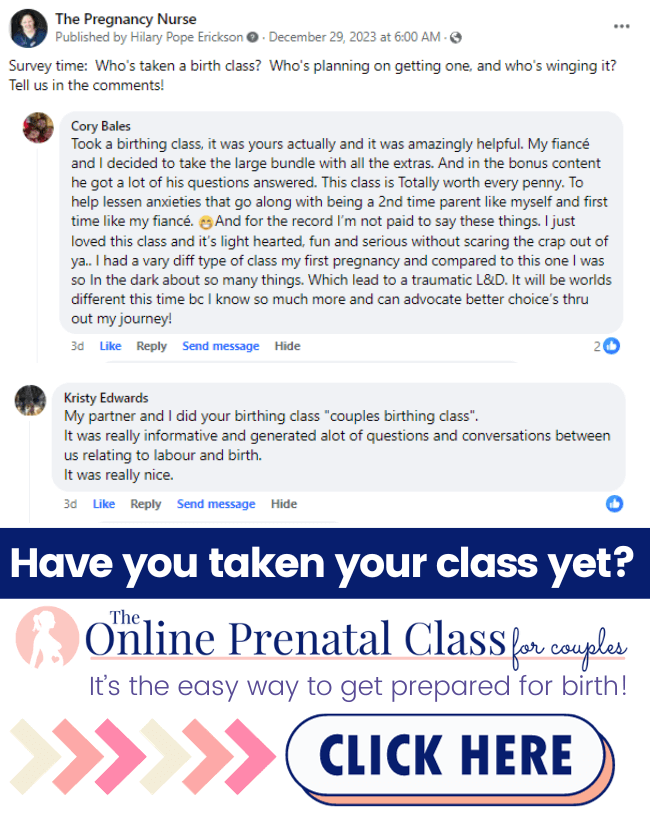Are you just DONE being pregnant and wondering how you can ask your provider to induce you? Let me, first of all, say that you are NOT alone. A lot of people want to be induced at the end of their pregnancy, so today I’m going to share some of the ways you can ask to be induced, and also some constraints your provider has about inducing you.
But how do I know so much about inductions? Hi, I’m Hilary — The Pregnancy Nurse®. I’ve been a nurse since 1997 and I have 20 years of labor and delivery experience. I’ve induced thousands of patients and talked to even more about their options. So, I’m a good resource on this for you.
How do I ask my doctor/midwife to induce me?
You say — Hey, I was wondering about an induction? What are your norms, or policies that you follow in regards to that?
Other things you could add (or not add):
- I am just really ____________ (insert reason you want to be induced)
- I am not sure it’s the right choice for me and I just wanted to talk about it
Learning to have conversations like this with your provider is SO important, but it really doesn’t come naturally to most people — which is why I have a bonus video all about provider communication in here.
Let’s talk a bit about the policies your provider has to follow to induce you….
Guidelines for an Induction of Labor
Your provider can’t just do whatever they want with an induction, mostly because they are done at a hospital that has VERY strict guidelines of what they can and can’t do.
No Elective Inductions Before 39 Weeks of Labor
An elective induction is one that does not have a medical reason.
They are also very strict on the reasons they will allow for a medical induction. They have to have “leapfrog codes” (dumb name, I’m aware) that allow them to induce prior to 39 weeks. I talk about that in my post on if you can ask to be induced at 37 weeks.
This means they can’t schedule you until that date — but most hospitals keep a calendar going and doctors can schedule a few days/weeks in advance (depending on the hospital). SO, if you want to be induced at 39 weeks, you can ask them when they can schedule that for you.
BTW we keep talking about your hospital stay — have you made your birth plan — grab mine right here:
Hospitals have their own guidelines
Because the hospital can’t schedule a lot of things all on one date they may have limitations on what they can/can not schedule. I know there are a good number of hospitals that do not allow elective inductions until 40 (or more) weeks.
It is mainly based on staffing and what the hospital has available.
Inductions tend to take longer, and require more room/staff time than regular labor. So, the hospital has to be mindful of the rooms and staff they have, and will enact policies to make that safe.
If hospital A has that policy, you can ask your provider if they have privilege’s elsewhere (meaning they can deliver at other hospitals). They may have a different hospital they can get you in sooner.
What to do if your provider says no?
Some providers just say they don’t electively induce patients.
Honestly, I find those very far and few anymore. ACOG sent the ARRIVE trial to all OBGYN’s a few years ago and now does say that providers should offer a 39 week induction if the hospital is able to take it. Here is the FAQ page on 39 week inductions.
If they just say no, I’d ask why or when they would consider inducing you. There’s no reason to not probe further, I promise you’re not hurting their feelings!

What information do you want?
While I’m not a strong proponent of vaginal exams for no reason, this may a time to have your provider check your cervix.
It is really important to know that if your cervix isn’t favorable your induction may be quite long. Perhaps longer than you imagine — I’m talking 2-3 days long.
The Arrive trial (where they compared being induced at 39 weeks vs just waiting for “mother nature”) showed that doesn’t increase your chance on a C-section, but it also did show that those patients have a long stay in labor and delivery.
BTW I have a whole ARRIVE trial bonus video in here that talks about what that study showed, and how to apply it to your case.
When you’re actively ripening your cervix and trying to get contractions going it may be more miserable and may be longer than you’d want.
If you waited a bit, your labor may be less intense (you may also be more likely to not require an epidural). So, that’s something to consider and the answer will be different for each person depending on what’s important for them.
What this boils down to is that there is absolutely NO reason to NOT ask to be induced. That’s 100% fine. Honestly, if you have ANY question that you want answered by your provider, ask it. I bet it’s not the first time we’ve heard it!
But, from there, you need to have a conversation with your provider about what they can offer you, and then ask how long you think it will be and then you decide if that works for you or not.
Talking with providers can be HARD but I can promise you they are all regular humans. They very much understand that you’re miserable, or need to plan your life — so just ask the question and see where it leads!
The other thing is that your provider truly can NOT give you all the information you need about labor at your appointments. Get a prenatal class in so you can save the big questions about YOU for your office visits, and still feel prepared. The Online Prenatal Class for Couples is the easy way to get prepared — it only takes a few hours and is meant to do with your partner!
Have you checked a birth class off your to do list✅? I have a few I recommend:
❤️ Best class for couples {per BabyList}
👩💻 Best class available on demand
⚡ Best class JUST for pain management
👶 Best Postpartum-Only Prep
❤️🧡💛💚💙💜 My favorite class is here.
Now is the time to get started!
Want to do a vibe check before diving into the whole thing with me? — check out my free labor pro tips. It’s your first step toward getting in the driver’s seat of your birth.






 What to Do If You Can’t Decide if You Want an Epidural or Not?
What to Do If You Can’t Decide if You Want an Epidural or Not?
